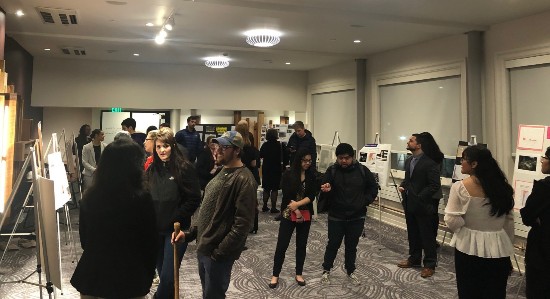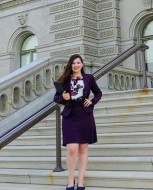Seattle Human Rights Day features student research and Abigail Echo-Hawk

For several years, students of the Washington D.C. Human Rights Seminar have participated in Seattle Human Rights Day by presenting their human rights research at the pre-program reception. The 2019 event was particularly special, as Abigail Echo-Hawk, both an IAS and D.C. Seminar alum, was a featured speaker in the main program, “Amplifying Missing and Murdered Indigenous Peoples’ Voices.”
The D.C. Seminar enables students to engage directly with national and international human rights policy-making through an on-campus course and six days in Washington D.C. While there, they meet with legislators, federal agencies, human rights NGOs, foreign embassies, and think tanks to investigate human rights violations and possible policy responses. After traveling, students spend the following quarter delving into a select research topic to deepen their understanding of the issue.
On December 12, D.C. Seminar students gathered at Town Hall Seattle to share their findings and recommendations. IAS student Johnny Wheeler presented his research on Palestinian self-determination, hoping his product would educate others. “I provided a historical look at the issue from the Balfour declaration to the Oslo Accords followed by a stakeholder section post Oslo,” said Wheeler.
Another IAS student, Midia De Souza, researched the issues of violence and femicide in the Northern Triangle countries of Central America (Honduras, Guatemala, and El Salvador) and their intersection with mass migration to the southern border. Sharing her three-pronged policy recommendation with attendees was meaningful for De Souza. “Most people knew about the border crisis, and the safe third country agreement,” she said, “but did not know the alarming rates of homicide and femicide or the reasons for the mass migration. I found value in sharing my research publicly for the feedback and interaction, as well as the knowledge and information I was able to share through my research.”

Alumni often cite the D.C. Seminar as one of their most formative learning experiences, and Abigail Echo-Hawk is a program alum who has dedicated her career to research and advocacy. Echo-Hawk currently serves as the Director of the Urban Indian Health Institute (UIHI), and the Chief Research Officer at the Seattle Indian Health Board.
A fierce advocate for native communities, Echo-Hawk was one of several speakers who participated in the Seattle Human Rights Day panel discussion “Amplifying Missing and Murdered Indigenous Peoples’ Voices.” The conversation centered the intersectional issues that contribute to Native people going missing and being murdered at a higher rate than any other ethnicity. UIHI recently published the report, MMIWG: We Demand More, in response to the Washington State Patrol’s “mediocre work” on the crisis of Missing and Murdered Indigenous Women and Girls (MMIWG).
“Seeing how Abigail Echo-Hawk has drawn awareness and brought people together has demonstrated to me the impact we can all have with our research,” said De Souza. “I was familiar with Echo-Hawk’s work because of a previous research project on homelessness in Seattle and the Native American population.”
D.C. Seminar coordinator Jung Lee attended the event and was impressed by the program. “The main focus of the event was pretty heavy,” she says, “but they prepared attendees well by sharing the contexts, personal stories, and their commitments to bring the public attention to the issue.” Echo-Hawk shared research data from a 2010 UIHI report which found that 94 of native women living in the Seattle had been raped or coerced in to sex at some point during their lives. Lee appreciated how the panelists related the crisis to other communities, calling everyone to take a role in the solution while creating space for native communities to lead efforts.
De Souza left the event feeling hopeful. “Being able to share my research at Town Hall Seattle with my fellow D.C. researchers, and alum Abigail Echo-Hawk was a special experience,” she said. “It helped me understand the value we bring in informing the public on the true causes of issues and ways in which we can go about creating holistic solutions.”
